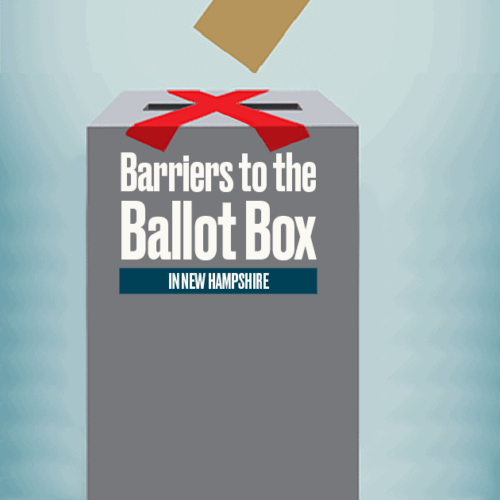Introduction
Historic restrictions on casting absentee ballots and early voting — as well as more recent attempts by Republicans to restrict college students’ access to the polls — have prompted court battles this year in New Hampshire.
Olivia Zink, executive director of Open Democracy, a nonpartisan New Hampshire-based nonprofit that advocates for campaign finance reform and voting rights, said the secretary of state’s office could have done far more this year to protect access to voting during the COVID-19 pandemic and clear up confusion.
Sign up for The Moment newsletter
Our CEO Susan Smith Richardson guides you through conversations and context on race and inequality.
“New Hampshire does a lot of things in person and on paper,” she said. It’s one of the only states in the nation to offer no way to register to vote or request an absentee ballot online.
Here’s a look at some of the most significant barriers to voting rights and access in the state:
Absentee ballots
New Hampshire does not allow early voting, and until this year permitted absentee ballots to be cast only in limited circumstances. The state has temporarily allowed any voter to use COVID-19 concerns as an excuse to vote absentee, but the state didn’t reprint envelopes that must accompany those ballots. As a result, residents may not realize that the way to use this excuse is to sign their name saying they have a “physical disability.”
“The process of requesting an absentee ballot and returning an absentee ballot, for voters who are not familiar with that process, is not the easiest thing,” Zink said. “Our secretary of state could have done better.”
And if something goes wrong, such as a voter forgetting to sign their name on the envelope, their ballot might not be counted. Zink said that some New Hampshire communities “pre-process” absentee ballot applications, contacting voters who’ve made errors and allowing them to come to a town hall on the Friday or Monday before the election to fix it. But others, including Manchester, the state’s largest city and one of the most diverse, don’t.
New Hampshire also has a 5 p.m. Election Day deadline by which absentee ballots must be received by local officials. More than one-third of rejected absentee ballots in the state’s September primary were tossed out because they arrived after that deadline.
The state isn’t providing secure drop boxes for absentee ballots like many other states and also has a law prohibiting anyone but a close family member of a voter from collecting absentee ballots and delivering them to local town halls. Earlier this month, a judge rejected a lawsuit brought by the American Federation of Teachers union that sought to reverse some of those restrictions and have ballots counted in New Hampshire as long as they were postmarked by Election Day.
Amid national news reports about U.S. Postal Service mail delivery slowdowns, Zink has specific concerns about New Hampshire. She said a recent change in Postal Service policy means that ballots mailed in one’s local town must be sent away to a regional processing center and then shipped back to be delivered to a town hall, rather than the local Post Office simply processing it and delivering it directly.
The absentee ballot rejection rate for the September primary was low, 1.89%, compared with 2.69% in the 2018 general election. But seared in Zink’s memory is the time she lost a city council election by a single vote.
Keeping college students from voting
After the 2016 presidential election, President Donald Trump made false allegations that “busloads of Massachusetts residents” had illegally voted in New Hampshire. Soon after, the state’s then-Republican-controlled legislature passed two pieces of legislation that would have changed the definition of who is a legal resident eligible to vote in the state. Students who primarily lived in the state while attending school would no longer be allowed to vote unless they obtained a New Hampshire driver’s license, paid property taxes or signed an apartment lease.
It sparked an uproar among advocates who saw it as a transparent attempt to suppress voting in college towns, whose support had long tilted toward Democrats.
A judge struck down the law as unconstitutional this spring. A related piece of legislation, requiring people who register to vote to obtain a New Hampshire driver’s license and register their car in the state within a certain period of time, has so far withstood legal scrutiny, but Zink said voting rights advocates are less concerned about it because it doesn’t stand in the way of anyone voting in the first place.
But the pandemic is creating new obstacles for college student voting. In 2016, more than 3,000 people registered to vote on the day of the election in Durham, home to the University of New Hampshire. This year, they’re arranging voter registration by appointment, Zink said, and have only made room for 600 slots.
At Dartmouth College in Hanover, the local polling place is at the fieldhouse on campus. But in other college towns — Plymouth, for example — it’s not within walking distance, and many students don’t have cars.
Registering to vote
It all comes back to what Zink sees as a fundamental problem with New Hampshire’s election rules.
“Everything is sort of geared toward doing things in person,” she said.
Same-day voter registration is allowed, but New Hampshire is one of the only states in the country that provides no way to register to vote online. PDFs of the voter registration form aren’t even available online for a resident to print out and mail to election officials. It has to be requested from the secretary of state’s office or a local town clerk.
Registering to vote by mail still requires proof of residency, and residents who are homeless or recently moved to the state must appear in person and sign a “domicile affidavit.”
Read more in Money and Democracy
US Polling Places
Indiana has made it harder for people to vote
The state was one of the first to require voters to show a photo ID at the polls, a practice that lowers Black and Latino voter turnout.
US Polling Places
Louisiana expands who can vote by mail this year, but other barriers remain
The state is among the minority requiring a witness signature on ballots, even during the pandemic. But lawmakers did extend voting rights to thousands more people.


Join the conversation
Show Comments